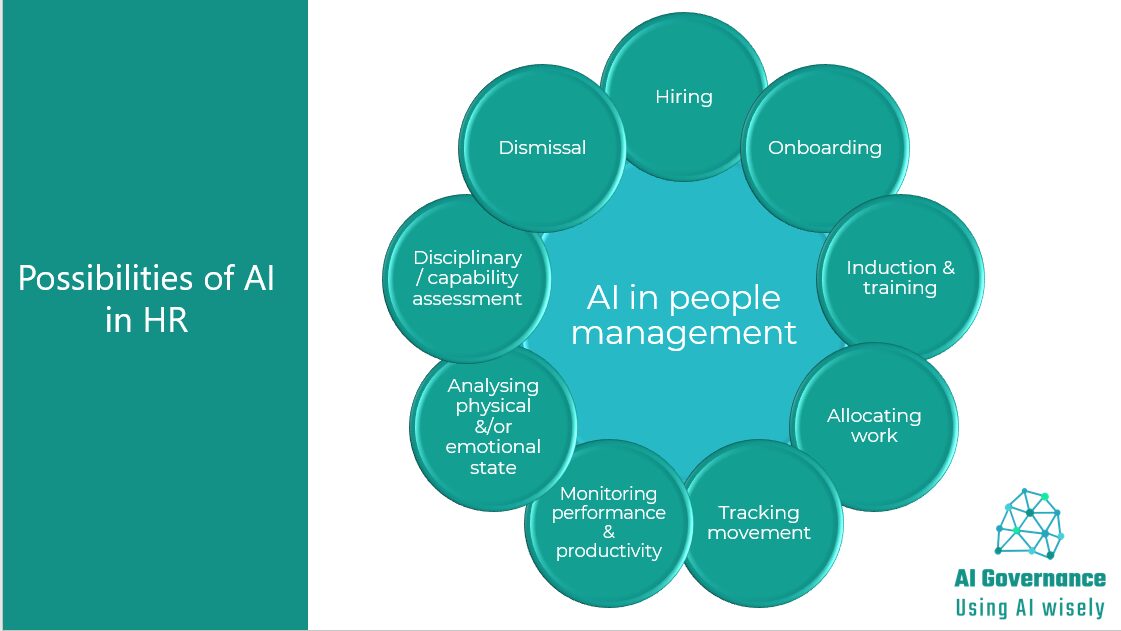“Artificial Intelligence (AI) is all over the news and the AI market is expected to grow to USD 15 trillion by 2030 – that’s three times the size of the mobile market. Contrary to what many people think, AI is not only for tech companies; it is getting into all types and sizes of businesses. In Canada, 54% of companies are reported to be using AI but most leaders don’t understand enough about what AI is to make sound investment decisions or establish reliable controls.” writes Sue Turner, AI & Data Governance & Ethics Specialist, AI Governance Limited, and a Non-Executive Director at UK ICMIF member Cornish Mutual.
We are pleased to share this guest blog from Sue, which was written for the benefit of ICMIF members following her presentation to the ICMIF HR Forum on the topic of AI and how it could benefit HR leaders.
Artificial Intelligence (AI) is all over the news and the AI market is expected to grow to USD 15 trillion by 2030 – that’s three times the size of the mobile market.
Contrary to what many people think, AI is not only for tech companies; it is getting into all types and sizes of businesses. In Canada, 54% of companies are reported to be using AI but most leaders don’t understand enough about what AI is to make sound investment decisions or establish reliable controls.
The recent AI Governance Report found:
- 58% of boards have no AI expertise and
- only 9% of businesses have mechanisms in place to assess AI risk and control it.

This means organisations will be slow to identify and seize the opportunities AI brings and at higher risk of making mistakes that can damage finances and reputations.
The first step in addressing these issues is for leaders to get educated in what AI is and how to harness its power. This is particularly important for HR leaders as so many AI-powered tools are available for their work.
Human resourcing provides enormous amounts of data. A company with 200 employees typically generates 400,000 work hours a year so if you capture that data you can use AI in everything from recruitment and hiring to training, performance evaluation and retention.
But there is very little executive education to support non-technical leaders to understand AI (and it’s often expensive) so my company, AI Governance, has stepped into the vacuum, training leaders on the essentials of AI.
We were delighted to collaborate with ICMIF to provide a presentation on Possibilities and pitfalls for Artificial Intelligence for HR leaders to the HR Forum as part of our mission to teach leaders about AI. Without using jargon, we help people see that AI is about finding patterns hidden in large amounts of data and using those patterns to predict, personalise or automate. This gives them the spring-board to start discussing how they could apply AI tools to the data they have.
How is AI being used in HR?
A survey of 259 HR leaders at US companies with 100+ employees found that most are already using AI in areas from hiring to performance management.
AI in recruitment can ensure that diverse skills are included. UK-based Cognisess uses machine learning to detect job applicant skills that are relevant to the client’s requirements. Their model gives a numerical representation to each of a candidate’s skills, so the client can see how close they are to what is required. So, if we want to recruit a claims manager, then we’ll also want to give different scores to skills like risk management or litigation as well as people skills like active listening. This ensures that all candidates, including those with non-traditional backgrounds, are given a fair chance.
AI can also be used to personalise training for employees. Mursion is a Silicon Valley VR-based AI training platform that enables employees to practice soft skills in realistic simulations. The model can mimic real-life scenarios, giving employees a safe environment to develop their skills.
But what are the downsides?
Research by the London School of Economics found AI in hiring was better than human hiring but people react negatively towards it. Often the best way to use AI in HR is to combine it with human skills. In a talent sourcing competition in the US, humans were more accurate than AI-tools in identifying the best candidates from thousands of applications. The AI “contestant” came in third but only needed three seconds to get to its results, whereas the humans who came first and second needed up to 24 hours to get their results.
Used well, AI can help with diversity, equity and inclusion agendas but there have been some well-publicised problems where insufficient thought has been given to AI tools, resulting in bias being inherent in them.
You could get rid of your annual staff survey and instead use AI to look for staff sentiment 365 days a year across all your communications channels. This can identify not just aggregate trends but who is starting debates and how people react to the CEO’s latest statement. You could use this information as part of decisions about who to promote, demote or make redundant, but should you?
A January 2023 survey of 300 HR leaders at US companies revealed that 98% said software and algorithms will help them make layoff decisions this year and some will provide no human input into the decision-making. There is very little regulation around AI use (although more is coming) so it is up to each organisation to decide how they will – and will not – use the opportunities AI offers. This means making ethical choices which is an area where everyone needs expert support.
Advice to HR leaders
HR professionals’ jobs are changing profoundly as AI automates processes and creates opportunities that need managing by those who understand it. So here are seven recommendations for HR professionals.
- Invest in your own skills so you can take the lead in understanding statistics and data and deciding how to use AI
- Educate your team so they can ask the right questions when buying in or developing AI tools
- Always give top priority to the responsible use of AI
- Spend time considering when and how humans will give oversight to AI tools
- Involve a wide variety of stakeholders to ensure you have diversity of thought in your use of AI tools
- Support the development of Board members’ skills by ensuring training and Board development in the possibilities and pitfalls of AI is offered to them to reduce the risks and encourage good use of AI tools
- Don’t join the war for talent! Find people across your organisation (outside IT) who like thinking logically and are interested in expanding their skills into data and AI techniques. Then, of course, take steps to guard and retain your recently-trained specialists.
Just like the internet enabled a new era of communication, AI is enabling us to predict, personalise and automate in ways that were not possible previously. Every leader who makes sure they are equipped to harness the power of AI with wisdom and integrity will find the coming years give them fascinating new opportunities.
If you would like to learn more about ICMIF’s HR Forum and our monthly (virtual) roundtables for HR Leaders please click here or contact Mike Ashurst, Vice-President, Reinsurance & Training.






